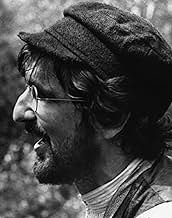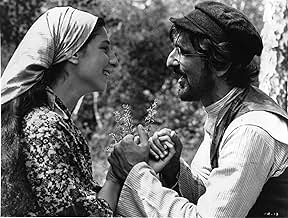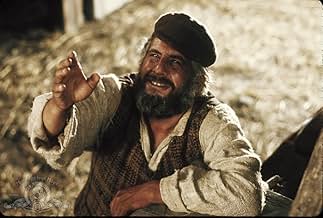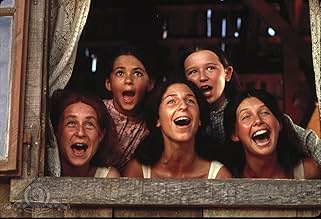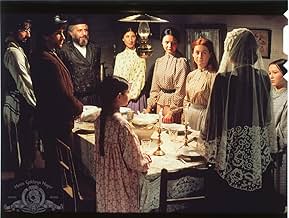Dans la Russie prérévolutionnaire, un paysan juif se bat contre le mariage de trois de ses filles alors que le sentiment antisémite croissant menace son village.Dans la Russie prérévolutionnaire, un paysan juif se bat contre le mariage de trois de ses filles alors que le sentiment antisémite croissant menace son village.Dans la Russie prérévolutionnaire, un paysan juif se bat contre le mariage de trois de ses filles alors que le sentiment antisémite croissant menace son village.
- A remporté 3 oscars
- 10 victoires et 14 nominations au total
Paul Michael Glaser
- Perchik
- (as Michael Glaser)
Ray Lovelock
- Fyedka
- (as Raymond Lovelock)
Avis en vedette
Opening with the wonderful song "Tradition" which is the overriding theme of the entire musical, with its comedy and its pain, this film is a charming, sentimental telling of the lives and tribulations of a family. The beauty of it is that despite occasional violence against a people, they maintain their spirit through the ages. It's about what every father believes, "There is no one adequate to marry my daughter." Things happen and people get knocked down, and eventually everyone gets to his feet once more. There is the combative relationship between Tevye and his wife, and their love ("but do you love me") that goes pretty much unstated. In the end they continue to stand tall together because what they have put into the world is true love, not the overly dramatic, silly love that permeates our world today. See the movie. See the stage play. You will always leave with an optimistic spring in your step, and wonderful songs in your heart.
In pre-revolutionary Russia, a poor Jewish peasant (Topol) must contend with marrying off his three daughters while antisemitic sentiment threatens his home.
Let me say this right of the bat: while this film may focus on a Jewish family and their struggle to enter the modern world (which may be good or bad), you certainly do not need to be Jewish to enjoy it. I always felt like this film (and "Yentl") were marketed towards the Jewish community, but it need not be. It is just a great story with excellent songs.
I loved the singing, the dancing, the story, the humor, the characters... there was really nothing I disliked about it. I was a bit surprised the eldest daughter was not Barbra Streisand, because they look identical. But, oh well. And I am also a bit surprised that the director was not Jewish, especially with a name like Jewison... but hey, he did a marvelous job!
Let me say this right of the bat: while this film may focus on a Jewish family and their struggle to enter the modern world (which may be good or bad), you certainly do not need to be Jewish to enjoy it. I always felt like this film (and "Yentl") were marketed towards the Jewish community, but it need not be. It is just a great story with excellent songs.
I loved the singing, the dancing, the story, the humor, the characters... there was really nothing I disliked about it. I was a bit surprised the eldest daughter was not Barbra Streisand, because they look identical. But, oh well. And I am also a bit surprised that the director was not Jewish, especially with a name like Jewison... but hey, he did a marvelous job!
I know people have complained about the length of this movie. Yeah, it is long, three hours approximately, but there are so many things that compensate. Norman Jewison's direction is very good, and the film is stylishly filmed, with some nice cinematography and there are nice scenery and costumes. The choreography is great, energetic in parts and graceful in others. Next, the music is outstanding. The incidental music largely reminiscent of Russian folk music is a real treat, but the songs are outstanding. The beautiful "Sunrise, Sunset", the fun "Tradition", the idealistic "Match Maker" and the energetic "If I Were A Rich Man", all amazing. Also, Topol, what an absolutely brilliant performance. He put body and soul into Tevye, successfully mixing humour, wisdom and poignancy and the result is one of the most memorable performances in any musical to grace our screens. All the other performances are wonderful, I liked it all five daughters had distinct personalities, and Norma Crane is fantastic as the mother. The story is both tight and poignant, about a milkman of Jewish values, who wishes his five daughters to marry. In conclusion, wonderful and definitely memorable. 10/10 Bethany Cox
10Spleen
The range and audacity of `Fiddler on the Roof' is stunning. By comparison today's musicals are timid, quaking things, terrified of frightening their audiences away however much `social relevance' bravado they may assume. This old musical is older than it looks. The film dates from 1971; the musical itself from 1963; but even then it was clear that it was the last of its kind, a delayed swan-song from the 1950s. There's sentiment, but no promise of a happy ending; humour, but not a trace of postmodern knowingness; realism, but and a willingness to indulge in fantasy, too. Musicals can't really survive without fantasy, and `Fiddler', along with `West Side Story', may very well mark the limit of just how serious it is possible to get without losing it. The songs are uniformly good. I don't know if Bock's music was usually so fitting, or if he happened to strike gold just once - not that it matters.
As for the film ... I only wish I'll get a chance to see it in a cinema, for the photography is beautiful - and it IS the photography that's doing it, since we're made to realise that neither the village nor its setting is picturesque in itself. Norman Jewison has assembled a cast not one member of which jars and makes the most of it. This film is quite long, and feels longer, but neither length nor apparent length is a liability.
As for the film ... I only wish I'll get a chance to see it in a cinema, for the photography is beautiful - and it IS the photography that's doing it, since we're made to realise that neither the village nor its setting is picturesque in itself. Norman Jewison has assembled a cast not one member of which jars and makes the most of it. This film is quite long, and feels longer, but neither length nor apparent length is a liability.
"Fiddler On the Roof" is the stage-to-screen adaptation of the famous musical. It tells the story of Tevye, a poor Jewish milkman in the tiny Russian village of Anatevka. This role is played by Topol, who played the character onstage in the London production of "Fiddler." We see him as a man mired in traditions, but struggling between his devout faith and the changing times when three of his daughters feel the urge to marry. The movie is beautifully shot, and tempers the story, which deals with the harsh realities of Jewish life in pre-Revolutionary Russia, with classic musical numbers sure to put a smile on your face. Between its incarnations on the stage and on screen, "Fiddler" will be immortal.
Le saviez-vous
- AnecdotesThe "Sunrise, Sunset" scene was not lit by electric movie lights but by hundreds of candles, by Cinematographer Ossie Morris. Years later, Norman Jewison said it was the best lit scene in any of his films.
- GaffesWhen the old man is talking to Tevye about Tzeitel, the shadow of the microphone boom is visible on the old man's shirt.
- Générique farfeluTopol and the cast sing "Tradition" without any opening credits rolling. At the end of the number, the fiddler standing on the left of the screen launches into an extensive solo while the opening credits roll on the right of the screen.
- Autres versionsOriginally released at 181 minutes (with an intermission); later trimmed for 1979 reissue to 149 minutes.
- ConnexionsEdited into 5 Second Movies: Fiddler on the Roof (2008)
- Bandes originalesTradition
(1964) (uncredited)
Music by Jerry Bock
Lyrics by Sheldon Harnick
Performed by Topol and Chorus in the pre-credits sequence
Meilleurs choix
Connectez-vous pour évaluer et surveiller les recommandations personnalisées
Détails
- Date de sortie
- Pays d’origine
- Langues
- Aussi connu sous le nom de
- Fiddler on the Roof
- Lieux de tournage
- Lekenik, Croatia(Anatevka)
- sociétés de production
- Consultez plus de crédits d'entreprise sur IMDbPro
Box-office
- Budget
- 9 000 000 $ US (estimation)
- Brut – États-Unis et Canada
- 10 404 330 $ US
- Fin de semaine d'ouverture – États-Unis et Canada
- 1 726 942 $ US
- 11 nov. 1979
- Brut – à l'échelle mondiale
- 10 407 890 $ US
- Durée
- 3h 1m(181 min)
- Couleur
- Rapport de forme
- 2.35 : 1
Contribuer à cette page
Suggérer une modification ou ajouter du contenu manquant






